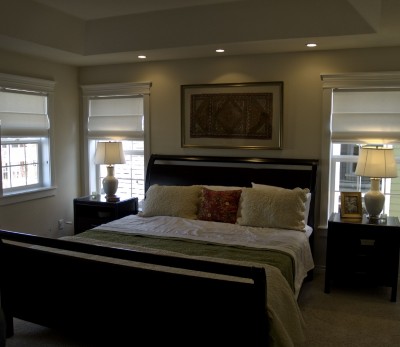The Right Sleep Environment
Making Your Bedroom a Hospitable Place For Good Sleep
It’s amazing, when you’re really flat-out exhausted, how simple and effortless it is to fall asleep. You seem to be able to just drop off anywhere: on the living room couch or in your easy chair, stretched out on the floor or sitting at your computer, on a crowded plane or in a busy airport terminal. You even hear about people dozing off standing up. It may not be the greatest sleep you’ve ever had, of course, but it seems so automatic and total, and you’d take every second you could get.
Amazing too, how hard it is sometimes to get a decent night’s sleep in the one place in the world where you ought to have everything going for you: your own bedroom.
The fact is that much of the time, sleep doesn’t come to us quite so automatically. And sometimes, even though we’ve spent the night in our very own bed, we feel like we might as well have slept standing up. Welcome to the grim, nighttime world of tangled sheets and limp pillows; warm, stale air; blue TV light; snoring spouses; barking neighborhood dogs and amorous stray cats.
If you’re looking to improve the quality of your sleep, you might want to start by considering your surroundings. Sleep can be a delicate, elusive thing. In order for it to grow and flourish, it has to be carefully cultivated in a hospitable environment.

We’re going to ask you to change the way you think about your bedroom. Do everything you can to make it a place that’s designed to promote the kind of easy, restful sleep you need. Take care of your bedroom and it will take care of your sleep. Treat it like a fragile ecosystem. Preserve and protect it. Make it your own secluded garden of slumber – a rich soil where good sleep can blossom and thrive.
Here are a few areas to pay attention to for starters:
- Keep It Cool: Your room temperature, that is. This can have a really significant effect on your ability to sleep comfortably and deeply. Your core body temperature drops slightly around bedtime and stays there through the better part of the night. A warm room works against this process which can cause your body’s sleep cycles to be interrupted.
- Eliminate Light: Your body sets its internal clock by the light levels around you. When it gets dark at night, you start to produce melatonin which helps bring on the feeling of sleepiness. So if there’s too much ambient light in your bedroom, it can counteract the urge to sleep. Some medical experts go so far as to say that keeping a properly darkened bedroom can even help inhibit cancer. If you find it hard to block out enough light, you might want to try a sleep mask or even special black-out curtains for the windows.
- Air Quality: This includes good air circulation and optimal humidity, as well as ensuring a dust and odor free environment. In order to sleep well, you have to be able to breathe easy. Ceiling fans and air filters can make a big difference here.
- Tidy Up: Make sure your bedroom is clean and free from clutter. Avoid using it for all those grubby daytime things like paying bills or doing work you brought home from the office, etc. Try to restrict your bedroom’s purposes to just two things: sleep and sex.
- Try This Mental Trick: When you walk into your bedroom at night to turn in, think of yourself as a different person. Once you walk in that room, you are no longer the one that everybody depends on to keep the plates spinning. You’re no longer Mom or Dad; the home owner with a mortgage; the citizen with taxes to pay; the employee with a deadline. Your sole purpose in life at that moment is simply to go to sleep and recharge your batteries.
- Quiet Please: Noise is an obvious but important factor to consider when setting up your sleeping space. Sadly, we don’t always have complete control over this one. If this is a problem area for you, consider wearing earplugs while you sleep. There are also several devices on the market that produce pleasant background sounds or even just white noise to mask those unwanted auditory intrusions. To every extent you can, work to make your bedroom a quiet room, free of noise and distractions.
- Make It Inviting: You don’t need to make your bedroom ready for HGTV. But you want it to be a simple, relaxing, aesthetically pleasing space that makes you feel good to be in.
- Consider Trying Aromatherapy: It does more than just smell good. The scent of lavender and other essential oils is thought by many experts to help promote relaxation, benefit sleep patterns and improve the overall quality of sleep.
Take your sleep environment seriously. Create an inviting haven where you can escape from the waking world, find rest and relaxation and drift off every night into sweet, sound sleep. You deserve it!
